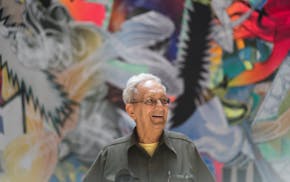Richard Darman, 64, the White House budget director who helped convince former President George H.W. Bush to renege on his no new taxes pledge, died Friday in Washington. He had battled leukemia for several months, according to a statement issued by former Secretary of State James A. Baker III, a longtime Darman friend.
Darman was chief architect of a compromise designed to reduce the federal budget deficit. Although it drew praise from many economic analysts, the plan included tax increases that broke Bush's 1988 election promise, "Read my lips, no new taxes."
Although the change of policy is partly blamed for Bush's reelection defeat to Bill Clinton in 1992, it contributed to balancing the federal budgets in the late 1990s.
Darman held many posts in government, beginning in 1971. Along with his jobs in many federal agencies, Darman taught at Harvard University's John F. Kennedy School of Government. At the time of his death, Darman was a partner in the Carlyle Group, a global private equity firm.
Darman is survived by his wife Kathleen Emmet, a writer, and three sons, William T.E. Darman, Jonathan W.E. Darman, and C.T. Emmet Darman.
Erich Kaestner, 107, a German believed to have been the country's last World War I veteran, died Jan. 1 in a nursing home in Cologne, Germany.
When France's second-last surviving veteran from World War I, Louis de Cazenave, died Jan. 20, the news made international headlines.
But in Germany -- which lost both world wars and has had to cope with the shame of the Nazi genocide for more than six decades -- there is not even an organization keeping track of the remaining veterans.
"That is the way history has developed," Kaestner's son, Peter Kaestner, told the Associated Press in a telephone interview. "In Germany, in this respect, these things are kept quiet -- they're not a big deal."
The news did not even trickle out into the German press until this week, and the stories were more about how Germans remember than about Kaestner's death itself.
Kaestner was born in 1900, and had just graduated from high school in 1918 when he entered the army, his son said.
Following training, he was sent to the Western Front to fight in France, but was never sent to the front lines, he said.
For Kaestner, his service during the war, in which more than 2 million German soldiers were killed, was only a small part of his long life, his son said.
"He was just a soldier for a quarter to a half a year," Peter Kaestner said.
Kaestner rejoined the military in 1939 with the outbreak of the Second World War, serving as a first lieutenant in ground support for the Luftwaffe, primarily in France.
Following the end of the war in 1945, Kaestner became a judge in Hanover.
Peter Kaestner said he had known his father was believed to be the last German veteran of the war, but that his family didn't really think much about it -- and were only aware of it from the letters his father had been receiving in recent years from people in the United States asking for autographs.
"He did not answer," his son said. "He didn't want to."
Dan Martin, 57, a guitar vendor whose clientele included Bruce Springsteen, Bob Dylan, Keith Richards, Eddie Van Halen, died Dec. 21 in his hometown of St. Charles, Mo. The cause of death was not immediately known.
Martin developed what friends called an ability to find the perfect instruments for some of the world's most famed guitarists. He operated two guitar shops and made frequent trips to New York and Los Angeles.
NEWS SERVICES

Twin Cities native Dolores Rosedale, glamorous '50s TV model and actress, dies at 95
Former Gophers, NFL player, pro wrestler Bob Bruggers dead at 80

Sean Burroughs, former MLB player, Little League World Series and Olympic champion, dies at 43

Steve Albini, influential producer of '90s rock and beyond, dies at 61

